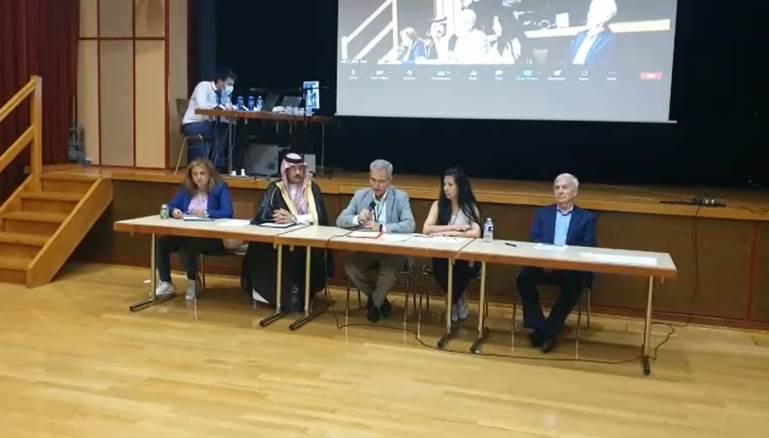Amid considerable controversy and widespread criticism, the National Conference for the Restoration of Resolution has announced its final statement as the conference’s general body. The Conference held its two-day meetings in Geneva, Switzerland, with an online presence from inside and outside Syria. The objective was to complete the organizational agenda in September, with the subsequent election of the Secretary-General, the Council of Elders, and executive office-holders from members of the Secretariat.
Surprise statement
The statement issued by the Conference stipulated as follows: “We seek to restore national sovereignty and uphold the unity and integrity of Syrian territory, as well as the freedom of the Syrian people in all their diversity.”
The statement also called for “the departure of all foreign occupying forces from the country, in line with the Syrian people’s intention to overthrow the dictatorship and obtain justice. The Syrian people also aim to hold criminals accountable and work towards forcibly freeing detainees and those disappeared in the prisons controlled by both the regime and terrorist organizations.”
The conference emphasized the Syrian people’s struggle as a “national liberation movement against foreign occupation and domestic tyranny.” It also focused on the need to draft an inclusive national settlement, based on “the basic parameters of the political solution negotiations, as provided for by the provisions of the Geneva One Conference in 2012, and relevant UN resolutions — including UN Resolution 2254.”
The statement expressed lofty intentions, surprising many observers, who had expected the statement to include less confrontational language towards the regime. These expectations reflected the fact that several participants live in regime-controlled areas, who are affiliated with the third current. Expectations of more moderate language also stemmed from the presence of Haitham Manaa, Khaled al-Mahamid, and other names close to the Kurdish Democratic Union Party in the Conference’s preparatory committee.
Read Also: For the First Time: Conference in Suweida Calls for the End of the Regime
In addition to the criteria adopted in nominating and selecting conference members, other criticisms were leveled at the final statement’s content. These criticisms particularly related to the order of issues and the existence of some general expressions, which some felt avoided directness. For instance, the statement discussed overthrowing the regime but omitted the name of Bashar al-Assad.
In responding to these objections, Conference General Secretariat member Colonel Mustafa Farhat said that the selection criteria for members were based on “patriotism and not committing crimes or violations.” Farhat responded to criticisms of the order of issues and some phrases shying away from directness as “reflecting those who adopt a negative pre-judgment”.
Read Also: For the First Time: Conference in Suweida Calls for the End of the Regime
“What was included in the conference documents is the consensus of most Syrian people. It is not possible to argue about the Syrian people’s rights to freedom, the departure of occupying forces, the accountability of criminals, and the preservation of Syrian territorial unity,” Farhat said in a statement to al-Modon. Farhat described objections to the final statement’s content as “getting caught in troubled water.” “When we say the overthrow of the regime,” said Farhat, “that phrase covers all the regime’s pillars and symbols; Al-Assad’s exclusion from this is inconceivable.”
Conference Institutions
In addition to adopting the Conference papers and documents and publishing the final statement, participants elected 31 members as members of the Secretariat. These elected members will manage the Conference’s offices and committees ahead of the next meeting, which has not yet been scheduled.
The most prominent names elected for this task are Major General Mohammed al-Haj Ali, Ibrahim Musallam, Bahia Mardini, Minerva al-Barouki, Marwan Khoury, Saleh al-Nabwani, Samir Al-Hawash, Asef Daaboul, Amer Quatli, Lami al-Labwani, Mamdouh al-Qudsi, Rawad Balan, and Iman Kaman al-Din. Major General Mohammed al-Hajj Ali is expected to be chosen as the Conference’s secretary-general, while Haitham Manaa is likely to be appointed as chairman of the Council of Elders.
Some fear that this conference will provide support for Russia’s interpretation of UN Resolution 2254, especially given that the conference is being led by opposition figures who have good relations with Moscow, such as Haitham Manaa and Khaled Al-Mahamid. Others believe that the Conference merely represents a new opposition platform added to other existing platforms. Still more see the Conference as a positive step in principle, at least in being a spark for the Syrian issue that has been politically stagnant for some time.
This article was translated and edited by The Syrian Observer. The Syrian Observer has not verified the content of this story. Responsibility for the information and views set out in this article lies entirely with the author.


